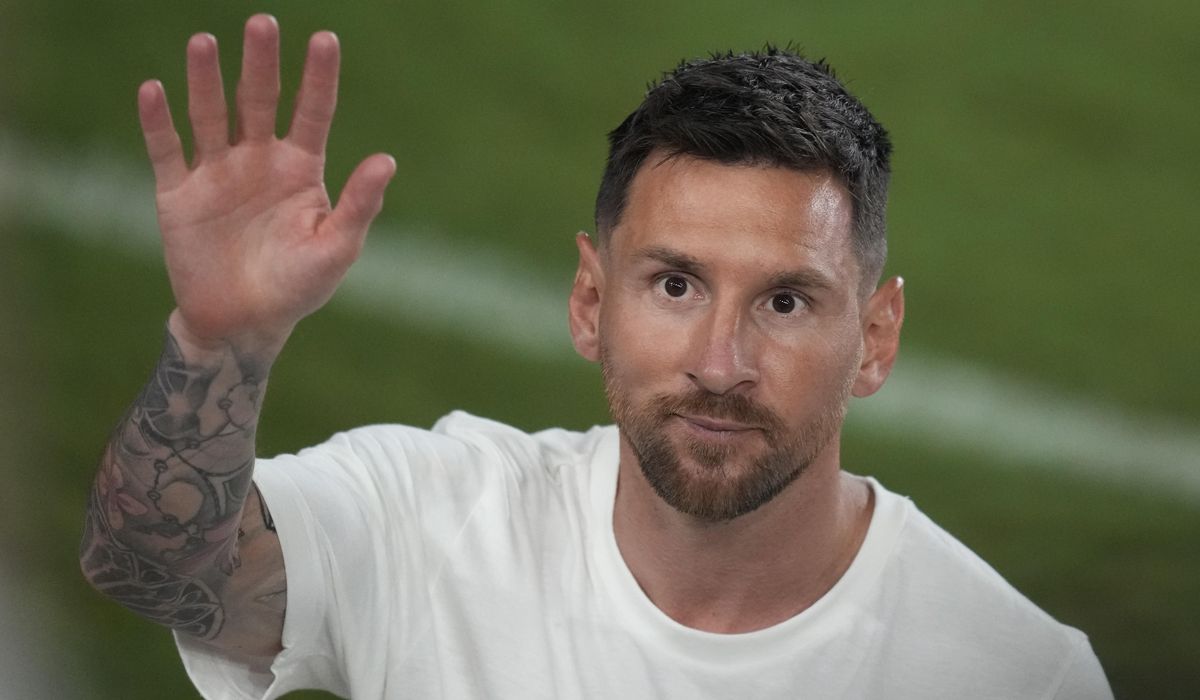Lionel Messi already providing jolt to MLS as All-Star Game descends on D.C.
Walker Zimmerman may not have the entire MLS schedule memorized, but the Nashville SC center back has circled Aug. 30. That’s when he and his team get to face Inter Miami — and Argentine superstar Lionel Messi.
Zimmerman’s phone has already blown up.
“Everyone knows — all their friends and family have hit them up for tickets,” Zimmerman said. “Everyone knows that game at this point.”
On Wednesday, Zimmerman and the rest of MLS’ biggest stars are set to face off against Arsenal of the English Premier League in an All-Star Game that’s a showcase for the burgeoning league. But while the exhibition in the District will draw eyeballs, the bigger bump for MLS will come soon two days later, when Messi makes his MLS debut for Inter Miami.
Messi’s arrival stateside is a monumental lift for the American soccer league, which has been fighting to capture the public eye ever since its inaugural season in 1996. Not since David Beckham — who coincidentally is now a co-owner of Inter Miami — joined the L.A. Galaxy in 2007 has there been a more high-profile addition to the MLS. But unlike Beckham, a superstar in his own right, Messi can realistically make a case that he’s the sport’s greatest player of all time. The excitement generated over Messi’s addition, in that sense, is much more comparable to Pele’s decision to play in the U.S. during the 1970s.
The impact of Messi’s decision, the league’s supporters say, will be felt in the short and the long term. Those dividends have already started taking place: Tickets for Messi’s first game are in such great demand that prices were being listed as high as nearly $57,000. According to TickPick, a secondary ticket company, eight of the 10 most-expensive MLS regular-season games on record now include Inter Miami.
But over the long term, MLS hopes that Messi’s signing helps inspire a new generation of soccer players — as well as boost the attractiveness of the league to other top players around the world.
MLS Commissioner Don Garber said “the real success factor” of Messi’s impact will be not in ticket sales and viewership, but in how it can boost the league’s reputation.
“At some point, five years from now, 10 years from now, there will be some player who was thinking about Major League Soccer because he saw the experience and success of Lionel Messi with Inter Miami,” Garber said.
To lure Messi, Inter Miami agreed to pay the 36-year-old between $50 million to $60 million per year over the next 2½ seasons. Beyond the cash total, which the MLS allowed to go beyond its typical player limits, incentives for Messi to join the franchise included reportedly giving him an ownership stake in the club once he retires. Messi’s camp also negotiated a revenue-sharing agreement with MLS and Apple, which will earn the forward a piece of the sides’ exclusive television rights.
The visibility of MLS’ games has been a challenge for the league. Under the old rights deal with Fox, ESPN and Univision, MLS games averaged just 285,000 viewers per game as of 2021. And so in February, with its rights deal up, MLS negotiated a 10-year, $2.5 billion deal with Apple — moving the games primarily to a streaming service. The bet is that the streamer will help grow MLS’ audience over the long haul, even if initial viewership is down.
Messi’s presence, in theory, should be a boost for the service that relies in large part on subscriptions. And though he’s 36 years old and in the latter part of his career, Messi is still playing at a relatively high level — he helped Argentina win a World Cup just eight months ago and earned the tournament’s Golden Ball, presented to the best player.
Messi’s talent may even be enough to get Inter Miami, one of the league’s worst teams with an 11-game losing streak, back into playoff contention this season.
“He has his legacy to live up to,” Chicago Fire striker Kei Kamara said. “He’s not one of those guys over his career that you say hasn’t performed or doesn’t want to do it. Either way, whatever attention he brings to our league … it’s going to give everyone extra energy to play.”
As an 18-year MLS veteran, Kamara has said he’s seen the league grow rapidly since he was drafted ninth overall in 2006. That’s most reflected, he said, in attendance — where MLS went from averaging 15.504 fans per game in 2006 to this season’s 21,913 — and the size of player salaries. Kamara, who makes $300,000, said the latter is particularly important if the league wants to continue to draw — and retain — top players.
But Messi now brings a different level of exposure.
“At some point, it’s just going to normalize,” Garber said. “It’s not going to be about growth and it’s not going to be about, ‘We’re achieving the unimaginable and defying what’s possible’ because we’ll just be another major league and doing what it does in creating thrills and agony on the field.”



